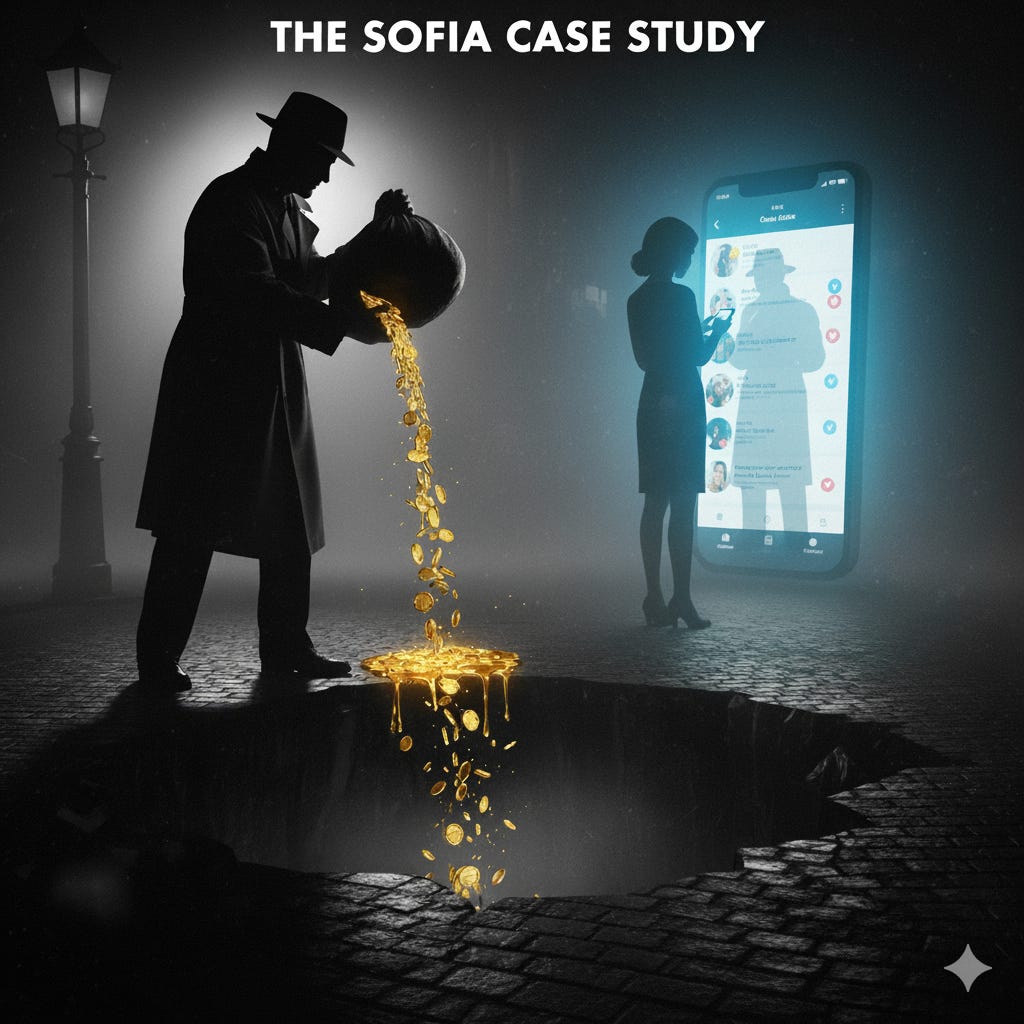The Flawed OS: Robert Glover's No More Mr. Nice Guy: The 4 Covert Contracts That Destroy Relationships (Complete Framework)
The forensic breakdown of Nice Guy syndrome. How covert contracts, oneitis, and validation-seeking create a perfect system for self-destruction.
The Bug in the Code
In the last chapter, we presented the crime scene—a life in ruins. We documented the catastrophic failures in The Defendant’s health, finances, and relationships. It was a damning indictment. But an indictment isn’t a conviction. To prove our case, we can’t simply stare at the wreckage. We must analyze the weapon. We must understand the mechanism of failure.
The first critical step in this forensic analysis is decompiling the source code that was running on The Defendant’s hardware. Every man runs on an operating system—an invisible set of rules, assumptions, and directives governing every decision, reaction, and perception. Most men aren’t running a custom, sovereign OS of their own design. They’re running buggy freeware acquired in childhood, installed without consent and riddled with critical vulnerabilities.
After examining The Defendant’s command logs, we’ve identified this malicious software. We’ve isolated its code. It wasn’t a virus caught in adulthood; it was the very OS he ran daily. We’ve designated it the NG-OS v1.0, also known as “The Nice Guy Protocol.”
This chapter is your masterclass on that Flawed OS. We’ll define its core mechanics with clinical precision, then walk through a damning case study—a relationship with a woman we’ll call “Sofia”—to show exactly how the NG-OS turns supposedly good intentions into catastrophic, life-altering destruction. We’re moving from the what of the crime scene to the how of the crime itself.
The Masterclass - A Clinician’s Guide to the NG-OS
Before analyzing the case study, you must understand this software’s architecture. Dr. Robert Glover’s seminal work No More Mr. Nice Guy provides our diagnostic manual. He was the first to successfully decompile this OS, and his framework serves as our primary forensic tool.
The NG-OS isn’t a simple personality quirk. It’s a complete, paradoxical, and pathologically flawed information processing system. Let’s examine its core components.
The Core Axiom - “I Am Not Enough”
At the kernel of the NG-OS, encrypted deep within its boot-sector, lies a single foundational belief: “I am inherently flawed and not enough on my own.”
This Core Axiom drives everything. All other subroutines compensate for this perceived flaw. The Nice Guy believes—deeper than conscious thought—that revealing his true self would mean immediate rejection, abandonment, and shame. His entire life becomes a performance, a carefully constructed mask hiding the “real” him while presenting an “acceptable” version to the world. He lives in constant, low-grade fear of being found out.
The Prime Directive - Avoid Conflict, Seek Validation
From the Core Axiom springs a two-part Prime Directive governing all decision-making:
Avoid Conflict at All Costs: Conflict is a critical threat. Any disagreement—a partner’s anger, a boss’s disapproval, a friend’s disappointment—signals imminent rejection and abandonment. The OS will sacrifice truth, integrity, and the user’s well-being to placate, appease, and smooth things over.
Seek External Validation Relentlessly: Since the Core Axiom declares “I am not enough,” validation can’t be generated internally. It must be imported. The Nice Guy becomes a validation junkie, constantly seeking others’ approval as proxy for self-worth. His identity is completely outsourced.
The Primary Tactic - The Covert Contract
How does one seek validation while avoiding conflict? The NG-OS employs a brilliant, insidious tactic: the Covert Contract.
A covert contract is an unspoken, unilateral agreement where the Nice Guy gives something (time, money, emotional support) secretly hoping to get something in return (love, sex, appreciation, respect). The key word is covert. The other party never knows the terms. The Nice Guy believes he’s making a fair trade, while the other person thinks they’re receiving a gift.
This is the ticking time bomb in all Nice Guy interactions. When the other party inevitably fails to uphold a bargain they never agreed to, the NG-OS doesn’t see misunderstanding—it sees malicious breach of contract, triggering toxic resentment and passive-aggression.
The Compounding Error - “Oneitis”
The NG-OS is already catastrophic software. But when infected with a specific virus, its destructive power becomes exponential. This virus is “Oneitis.”
Oneitis is the irrational, obsessive belief that one specific person holds the unique key to your happiness, validation, and salvation. It’s the antithesis of abundance mindset. When a Nice Guy catches oneitis, he fixates on a single target—typically a romantic interest—as The One. This hyper-focus creates profound scarcity. All other women become invisible. All other paths to happiness disappear. The validation of this one person becomes the ultimate prize.
When severe oneitis combines with the NG-OS, the results are devastating. The Nice Guy now accepts horrifically one-sided covert contracts. He’ll drain his bank account, sacrifice his integrity, and set himself on fire to keep the “one” warm, all secretly hoping she’ll eventually fulfill her side of the unspoken bargain. This is the stage where The Defendant’s greatest tragedies played out.
Case Study - The Autopsy of “Sofia”
Theory is clean. Reality is messy. Let’s place a specific event from The Defendant’s life on the table: his relationship with Sofia. This case study is a textbook example of the NG-OS, supercharged by oneitis, executing its programming with lethal precision.
The Target - Activation of the ‘Savior’ & ‘Oneitis’ Subroutines
The Defendant met Sofia when his life lacked any internal purpose. She and her young child presented significant chaos—financial instability, relational drama, and general lack of forward momentum.
For a healthy operating system, this chaos would be a red flag signaling extreme caution or disengagement. For The Defendant’s NG-OS, it was a siren’s call. The chaos wasn’t a threat; it was opportunity. It triggered his most powerful subroutine: the “Savior.” His OS identified the situation as a perfect chance to gain meaning and validation by “fixing” her broken world. He could be the hero, the provider, the rescuer.
Compounding this error, he was immediately infected with severe oneitis. He fixated on Sofia—beautiful and charismatic—as the singular key to his happiness. This hyper-focus blinded him to stark reality and the abundance of healthier connection possibilities. The NG-OS had its target. The prize was clear: this specific woman’s validation. The only remaining question was the price.
Writing the Covert Contract
Fully in the grip of the NG-OS and oneitis, The Defendant began drafting the most destructive covert contract of his life. He never spoke it aloud, but the terms were being written in his mind’s back office with possessed intensity. Forensic analysis of his actions reveals the contract’s clauses:
THE DEFENDANT AGREES TO:
Become primary financial support, covering expenses and providing safety net
Act as full-time emotional support system, therapist, and strategic advisor
Integrate into child’s life, providing stability and resources
Perform all duties of committed partner, provider, and co-parent
IN RETURN, THE DEFENDANT EXPECTS:
Romantic love and affection
Eventual public declaration of committed, exclusive relationship
Physical intimacy
Validation of having “won” a beautiful woman and “saved” a family
This transaction felt not only logical but noble. The purpose it provided was intoxicating. Combined with his pre-existing spending mentality, the NG-OS had all justification needed to liquidate his resources in service of the contract.
The Breach of Contract - A Public Invalidation
For months, The Defendant executed his side with near-perfect compliance. He poured time, energy, and ruinous amounts of money into Sofia’s life. He was, for all purposes, the acting boyfriend, provider, and pseudo-father.
The contract was breached not in dramatic fight, but in quiet, soul-crushing public invalidations. The Defendant paid the full emotional and financial price of being “the boyfriend,” yet was explicitly forbidden from claiming the title. Sofia instructed him not to tell mutual acquaintances they were together. His presence was erased from her social media. This wasn’t passive omission; it was active, strategic denial of his status.
The system began producing error messages. The investment produced zero returns. But oneitis was strong, sunk costs were high. He continued executing the contract, hoping his “performance” would eventually change the outcome.
The final crash was triggered by external data his delusion couldn’t ignore. In casual conversation, his brother-in-law, unaware of the complex psychodrama, asked a simple question about Sofia. The Defendant’s evasive answer and the flicker of confusion and pity in his brother-in-law’s eyes pierced the veil. In that moment, he saw himself through a normal man’s eyes. He saw the pathetic absurdity of his accepted deal. He saw truth. The system crashed.
The Inevitable Crash - Diagnosis of the Aftermath
The emotional fallout was exactly what the NG-OS produces: toxic, debilitating resentment and shame.
The resentment was hot, righteous rage at Sofia. How could she? After all he’d done, how could she so brazenly violate his secret game’s terms? He felt cheated, used, utterly disrespected.
But beneath resentment was a more destructive force: shame. Cold, gut-wrenching shame at himself. Shame that oneitis had blinded him into accepting such a horrifically bad deal. Shame that he’d liquidated his future to fund his own erasure. Shame that he lacked courage to confront the situation, only bailing, as he later admitted, “way too late.”
This is the guaranteed emotional output of the Nice Guy OS. It’s a system perfectly engineered to produce powerless rage and profound personal shame. It’s suicide code.
The Systemic Corruption
Don’t view the “Sofia” case as mere “relationship problem.” The NG-OS isn’t localized infection. It’s systemic vulnerability corrupting every domain of its host’s life.
The Financial Drain
The Defendant’s financial ruin wasn’t separate. It was direct NG-OS symptom. The ‘Savior’ instinct, supercharged by oneitis, requires capital. The compulsion to “buy” singular, idealized love via massively unfavorable covert contracts drove his spending mentality. His inability to build a war chest was a feature, not bug—a man with no resources must stay in the game, keep trying to “fix” it.
The Professional Stagnation
The NG-OS’s prime directive—avoid conflict, seek validation—explains The Defendant’s career purgatory. His banking job complacency wasn’t laziness. It was calculated risk-avoidance protocol. He couldn’t risk conflict negotiating for more, couldn’t risk superiors’ disapproval proposing bold ideas, certainly couldn’t risk leaving “safe” paycheck to build something of his own. He remained trapped in quiet competence because the OS identified the outside world as too dangerous.
The Physiological Manifestation
Finally, the medical examiner’s report. The body keeps score. Chronic stress from managing failing covert contracts, anxiety from severe oneitis, suppressed rage from inevitable “breaches”—all created constant systemic inflammation. The Defendant’s body marinated in cortisol and adrenaline. This physiological state directly contributes to insulin resistance, hypertension, and the entire metabolic disease suite he suffered. His OS was literally killing his hardware.
The Mandate for a System Wipe
The evidence is conclusive. The Nice Guy Operating System isn’t a personality quirk or set of “bad habits.” It’s terminal malware. From foundational axiom to prime directive, it’s designed to produce failure, resentment, and shame.
It can’t be patched. It can’t be updated. Attempting to “be a better Nice Guy” or write “fairer” covert contracts is like optimizing a virus. It’s a fool’s errand. It’s strategically and spiritually bankrupt.
The only viable action for an operator discovering this code in his own mind is complete system wipe.
But before installing a new, sovereign operating system, we must understand the hardware it runs on. If the NG-OS is so fundamentally destructive, why was it installed so deeply? What threat was it designed to protect against?
To answer that, we must leave the coding lab’s clean room and enter the shadowy, unpredictable world of the subconscious. We must go hunting for the ghost in the machine.




